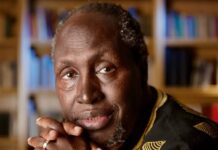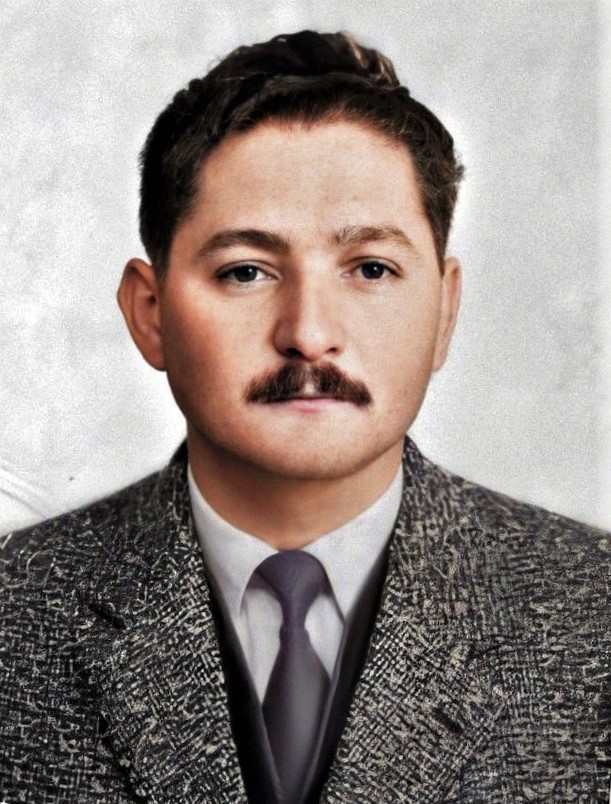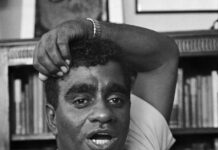📢 Follow our WhatsApp Channel for the latest literary updates!
Akinwande Oluwole Babatunde Soyinka, popularly known as Wole Soyinka, is a renowned Nigerian dramatist, poet, novelist, literary critic, and political activist. Soyinka was the first Black African to be awarded the Nobel Prize in Literature in 1986, a recognition of his significant contributions to world literature. His work reflects a complex blend of literary traditions, Yoruba culture, and a strong engagement with the political and social realities of Nigeria, Africa, and the postcolonial world.
Overview
| Full Name | Akinwande Oluwole Babatunde Soyinka |
|---|---|
| Born | 13 July 1934 (age 90), Abeokuta, Nigeria |
| Nationality | Nigerian |
| Occupation | Playwright, Poet, Essayist, Novelist, Activist |
| Alma Mater | University College Ibadan (now University of Ibadan), University of Leeds |
| Genres | Drama, Poetry, Satire, Political Commentary |
| Notable Works | Death and the King’s Horseman, The Man Died, A Dance of the Forests, The Interpreters, Chronicles from the Land of the Happiest People on Earth |
| Nobel Prize | 1986, Nobel Prize in Literature |
| Period of Writing | 1957–present |
| Themes | Corruption, Tyranny, Postcolonialism, Tradition vs Modernity, Social Justice |
| Major Awards and Honors | Nobel Prize in Literature (1986), Anisfield-Wolf Book Award, Europe Theatre Prize (2017) |
| Notable Recent Work | Chronicles from the Land of the Happiest People on Earth (2020) |
| Academic Career | Taught at universities including Harvard, Cornell, Emory, Obafemi Awolowo University |
Early Life and Education
Soyinka was born on July 13, 1934, in Abeokuta, Nigeria, during the British colonial period. His father, Samuel Ayodele Soyinka, was a headmaster, and his mother, Grace Eniola Soyinka, was a prominent shopkeeper and activist, both of whom played an influential role in shaping his intellectual and political development. Soyinka’s maternal lineage connected him to a notable family of Nigerian activists, which included his uncle, Rev. A. O. Ransome-Kuti, who was a principal at Abeokuta Grammar School and a key influence during his formative years.
Soyinka’s education began at St. Peter’s Primary School in Abeokuta, where his father served as headmaster. He later attended Abeokuta Grammar School and Government College in Ibadan. In 1952, Soyinka enrolled at University College Ibadan (now University of Ibadan), where he studied English Literature. His education continued at the University of Leeds in the United Kingdom, where he earned his degree in English. While in England, he was mentored by prominent literary figures such as G. Wilson Knight and Arnold Kettle.
Soyinka’s early works were characterised by their experimental and satirical nature. He was heavily influenced by his experiences as a bouncer, barman, and bricklayer during his time in Europe, which he later reflected in works such as “Telephone Conversation” and “A Maverick in the Land of the Dykes.” His theatrical career took off at the Royal Court Theatre in London, where he was part of an experimental workshop that introduced him to avant-garde playwrights like John Osborne and Harold Pinter. It was here that Soyinka premiered his first professional one-act play, The Invention, in 1959.
After returning to Nigeria in 1959, Soyinka founded the 1960 Masks, a theatre company dedicated to exploring African theatrical forms. His groundbreaking play A Dance of the Forests was commissioned for Nigeria’s independence celebrations in 1960. This marks a pivotal moment in his career as he sought to blend African traditions with Western theatrical forms.
Soyinka’s works often address the political turbulence and social injustices in Nigeria. His bold activism led to multiple confrontations with Nigerian authorities. This includes his arrest during the Nigerian Civil War (1967–1970). During his nearly two-year imprisonment, Soyinka wrote notable works such as The Man Died and A Shuttle in the Crypt, which chronicle his experiences in solitary confinement and the broader issues of leadership and morality in postcolonial Nigeria.
Soyinka’s literary output spans over several decades and includes poetry, drama, essays, and autobiographies. His influential writings include The Lion and the Jewel, Kongi’s Harvest, Death and the King’s Horseman, and Madmen and Specialists.
Political Engagement and Imprisonment
Soyinka’s creative journey has been deeply intertwined with his political activism. His outspoken criticism of political corruption and his strong stance against oppression in postcolonial Nigeria have marked him as a fearless advocate for justice. His early confrontation with authority began with the civilian government, which led to multiple clashes with the regime. When Nigeria experienced its first military coup in the mid-1960s, Soyinka’s involvement in efforts to foster peace and his condemnation of the ensuing chaos earned him the ire of the authorities.
Soyinka was arrested in 1967, accused of attempting to negotiate peace during the Nigerian Civil War by visiting Biafra, the breakaway republic. He was held in solitary confinement for nearly two years, an experience that profoundly shaped his writing and political outlook. Despite being denied access to writing materials, Soyinka managed to document his prison experiences through whatever means available—using materials such as toilet paper and cigarette packets to write poetry and notes. His memoir, The Man Died: Prison Notes of Wole Soyinka, captures his harrowing time in detention and stands as a testament to his resilience.
Throughout his imprisonment, Soyinka maintained his creative output, producing works that reflected the devastating consequences of corrupt leadership and political instability. His poetry collection A Shuttle in the Crypt (1972) and his play Madmen and Specialists (1971) are notable examples of his work during this period. These writings reflect his deep disillusionment with the state of Nigeria and the broader challenges facing postcolonial African states.
Following his release from prison, Soyinka was forced into self-imposed exile, where he continued to be a vocal critic of successive Nigerian governments. His advocacy for human rights and political transparency did not wane, even in the face of personal danger. In 1994, during the regime of General Sani Abacha, Soyinka fled Nigeria once again, fearing for his life after his vocal opposition to Abacha’s dictatorial rule.
Later Life and Recent Writings
In the decades following his exile, Soyinka maintained his presence on the global literary and political stage. While much of his early work explored the intersections of tradition, modernity, and power, his more recent writings have delved deeper into global issues such as religious extremism, state-sponsored violence, and climate change. His 2006 memoir You Must Set Forth at Dawn provides a reflective account of his life, activism, and the long shadow of political oppression in Africa.
In 2020, Soyinka returned to fiction after nearly five decades with Chronicles from the Land of the Happiest People on Earth. This novel, a biting political satire, revisits many of his signature themes—corruption, the abuse of power, and societal decay—but with a fresh, contemporary edge in his projection of the commoditisation of the human body parts. The book received critical acclaim for its sharp, allegorical narrative, painting a surreal yet painfully realistic portrait of a nation on the brink of moral collapse. Chronicles echoes Soyinka’s long-standing concerns with Nigeria’s sociopolitical landscape but also broadens its scope to reflect global disillusionment with leadership and governance in the 21st century.
Wole Soyinka’s voice remains influential in global conversations about freedom, governance, and the role of the artist in society. In recent years, he has spoken out against rising authoritarianism in Africa, religious fundamentalism, and the erosion of democratic principles worldwide.
In recognition of his lasting contributions to literature and human rights, Soyinka has been the recipient of numerous awards and honorary degrees. He remains one of Africa’s most revered literary figures, as relevant today as he was in the early days of his career.
Major Works and Theme
Wole Soyinka wants to be recognized mainly as a dramatist and a man of the theatre. He made this clear during his Nobel Prize acceptance speech, which he dedicated to Nelson Mandela. He reflected on his early theatrical days to highlight important political issues in today’s world. This recognition is well-deserved, especially considering his wide range of plays.
Soyinka’s dramas often include elements from his poetry, like vivid language, compelling narratives, and symbolic imagery. His plays explore significant themes such as identity, salvation, betrayal, cultural survival, corruption, and the destruction of human potential. His characters often face social and political challenges, revealing the struggle between creativity and destructive power.
In Yoruba culture, total destruction is impossible. The worldview includes the living, the dead, and the unborn, all connected in a cycle. This concept influences many of Soyinka’s works like The Swamp Dwellers, The Strong Breed, The Road, Ogun Abibiman, The Bacchae of Euripides and Death and the King’s Horseman. Man strives to understand the transitional passage which viscerally links the worlds of the living, the dead, and the unborn, for within this unknown abyss lies man’s essences and reasons for being. The Yoruba Ifa oracle serves as a source of knowledge about existence for individuals and communities alike.
The Yoruba people are adaptable. They view contact with other cultures, including colonial influences, as an opportunity for learning. This adaptability explains the survival of Yoruba culture in the New World during and after slavery. Soyinka often blends these two cultural influences in his work, minimising colonial impacts to focus on his cultural objectives.
In his political works like Kongi’s Harvest and Madmen and Specialists, Soyinka stresses the need for Africans to take responsibility for how they adapt foreign influences. His characters often struggle with the tension between power and creativity, as seen in Madmen and Specialists, which he considers his most pessimistic play.
In The Road, a character named the Professor seeks knowledge about death but must experience disintegration to find restoration. In contrast, Elesin-Oba from Death and the King’s Horseman also faces a personal failure that limits his will. This failing connects to the cosmic world of Ogun, the spiritual god in Yoruba mythology.
Soyinka’s characters often feel helpless despite their will to create change. This reflects Soyinka’s own struggles against political corruption, which have sometimes left him powerless, like during his imprisonment in the Nigerian-Biafran civil war.
Despite the struggles, Soyinka’s “dreamers” maintain hope. His Nobel Prize acceptance speech suggests that the ideas of these revolutionary dreamers can eventually lead to change. Their challenges illustrate the conflict between their ideals and human limitations.
His language skillfully weaves together the metaphysical and the tangible. He draws on Yoruba traditions while also making global connections. His characters engage with Yoruba deities like Oya and Yemoja.
Wole Soyinka critiques societal structures while hinting at hope, even when his stories don’t offer clear resolutions. This mirrors the uncertainties faced by postcolonial African societies dealing with leadership crises and cultural change.
Critical Reception
In the early stages of Wole Soyinka’s career, critics acknowledged his innovative use of language but often found it difficult, obscure, and overly elaborate. A reviewer of his first professional play, The Invention, criticised it for being “too easy” and embarrassing, calling its imagery “unusual and unprecise” (Spectator, November 6, 1959). Soyinka himself felt similarly embarrassed, recalling a time when he refused to participate in a workshop performance about the “Mau Mau” rebellion because the dramatic text was framed from a Western viewpoint (Nobel Prize speech). The critic’s indifference to the African subject contrasted with Soyinka’s deep understanding of the context.
Nigerian critics also had mixed feelings about the 1960 production of A Dance of the Forests, labeling it “Africana Exotica” (Transition, November 1963), which undermined Soyinka’s aim of creating “an exciting theatre.” Similarly, an English critic described the satire in the 1966 production of The Lion and the Jewel as “pale and naive for international delectation” (Plays and Players, February 1967), but overall, reviews of the production were mostly positive.
Soyinka’s plays often face two critical challenges. In Nigeria, while actors emotionally connect with the roles, they struggle with the language’s “foreignness,” despite Soyinka’s grasp of Yoruba nuances. In North America, audiences find the mythic imagery and cultural subtleties difficult to grasp, affecting the performances of otherwise skilled actors. Nevertheless, later critics have come to appreciate his language as compelling and profound. More recent productions have generally received favourable reviews, although one politically biased review of the otherwise acclaimed Death and the King’s Horseman in The New York Times (December 11, 1984) stands out as a negative exception.
In the literary criticism landscape, some left-wing Nigerian Marxist intellectuals from the 1960s and 1970s preferred writers like Ngũgĩ wa Thiong’o and Ousmane Sembene for their socialist narratives, and Chinua Achebe for his simple narration. They viewed Soyinka as elitist and inconsistent with revolutionary ideals. Soyinka countered these claims in articles like “Who’s Afraid of Elesin-Oba?” where he critiqued his Marxist detractors as intellectually naive and detached. He asserted that his art aims to recreate realities through diverse mediums, and he does not adhere to any strict ideological framework.
Wole Soyinka also distances himself from the Negritude movement, which seeks to celebrate African identity but often adopts a sentimental perspective he finds limiting. While he acknowledges the movement’s vision, he criticises its reliance on a European philosophical framework (Myth, Literature, and the African World). He has famously remarked that like a tiger, one does not need to proclaim their “tigritude,” implying that true identity does not require validation.
Critics who challenge Soyinka’s stance often invoke the same arguments he uses against them, questioning the African authenticity of his European influences, such as his use of the English language. Soyinka dismisses this criticism, asserting that creative expression should not be restricted by foreign influences, which are inescapable in a globalised world (Gates, “Interview”). He emphasises the significance of the re-creative process in his work. While some critics have found his mythic elements obscure, he strives to integrate these influences with his African identity.
Despite potential misunderstandings of his work, Soyinka’s literary genius and activism against oppression have earned him national and international acclaim, often overshadowing criticisms. His unwavering commitment to social justice has persisted, as he confronts oppressive regimes that threaten creative expression.
A List of Books by Wole Soyinka
| Titles | Study Guides |
|---|---|
| A Dance of the Forests (1960) | Not Available |
| The Swamp Dwellers (1961) | Not Available |
| The Lion and the Jewel (1962) | Available |
| A Dance of the Forests (1963) | Not Available |
| The Strong Breed (1963) | Not Available |
| The Trials of Brother Jero (1964) | Not Available |
| The Interpreters (1965) | Not Available |
| Kongi’s Harvest (1965) | Not Available |
| The Road (1965) | Not Available |
| Jero’s Metamorphosis (1966) | Not Available |
| Idanre and Other Poems (1967) | Not Available |
| The Forest of a Thousand Daemons: A Hunter’s Saga (1968) | Not Available |
| Madmen and Specialists (1971) | Not Available |
| Before the Blackout (1971) | Not Available |
| A Shuttle in the Crypt (1972) | Not Available |
| The Man Died: Prison Notes of Wole Soyinka (1972) | Not Applicable |
| Camwood on the Leaves (1973) | Not Available |
| Season of Anomy (1973) | Not Available |
| The Bacchae of Euripides: A Communion Rite (1973) | Not Available |
| Death and the King’s Horseman (1975) | Not Available |
| Myth, Literature, and the African World (1976) | Not Applicable |
| Ogun Abibiman (1976) | Not Available |
| Aké: The Years of Childhood (1981) | Not Applicable |
| Opera Wonyosi (1981) | Not Available |
| Requiem for a Futurologist (1983) | Not Available |
| Blues for a Prodigal (1984) | Not Applicable |
| A Play of Giants (1984) | Not Available |
| Mandela’s Earth and Other Poems (1988) | Not Available |
| Isara: A Voyage Around “Essay” (1989) | Not Applicable |
| From Zia with Love (1992) | Available Upon Request |
| A Scourge of Hyacinths (1992) | Not Available |
| Ibadan: The Penkelemes Years: A Memoir, 1946–1965 (1994) | Not Available |
| The Beatification of Area Boy (1995) | Not Available |
| King Baabu (2001) | Not Available |
| You Must Set Forth at Dawn (2006) | Not Applicable |
| Alapata Apata (2011) | Available Upon Request |
| Of Africa (2012) | Not Applicable |
| Chronicles from the Land of the Happiest People on Earth (2021) | Not Available |
Reference
Euba, Femi. “Wole Soyinka.” Postcolonial African Writers: A Bio-bibliographical Critical Sourcebook, edited by Pushpa Naidu Parekh and Siga Fatima Jagne, Greenwood Press, 1998, pp. 438-454.
Join Our Social Media Channels:
- WhatsApp: Literature PADI
- Telegram: Literature PADI
- YouTube: @literaturepadi
- Facebook: Literature PADI











